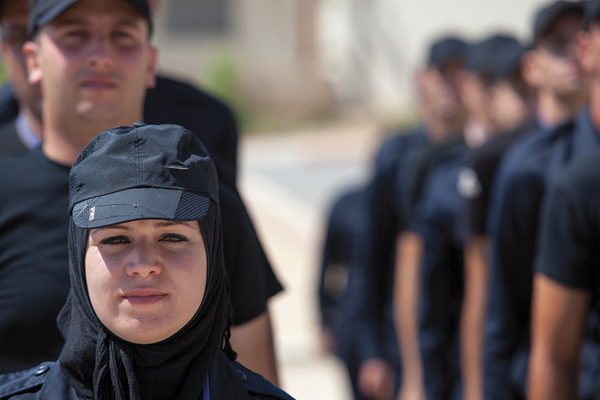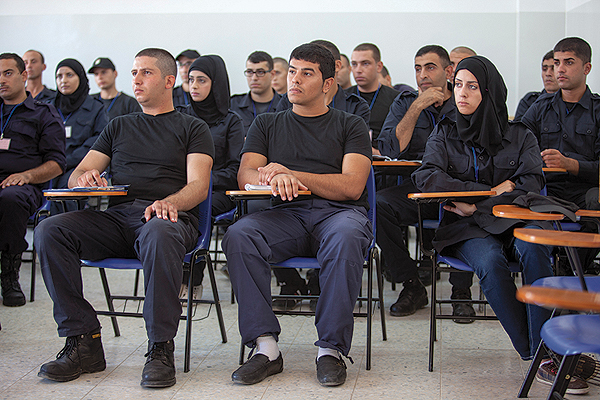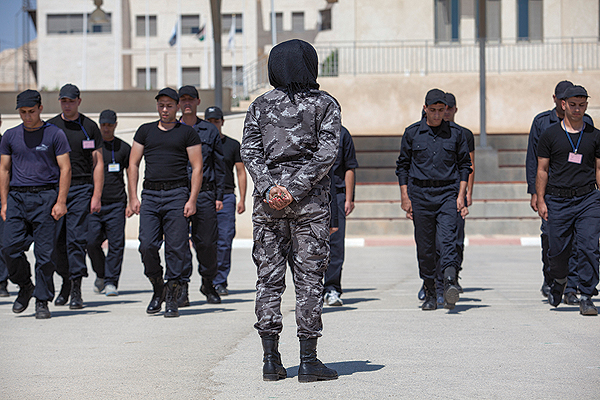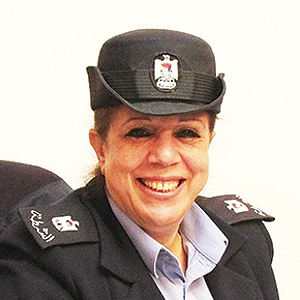
Gender is a singular concept, newly talked about, often misunderstood, and frequently resisted. Proponents connect it with social relations and women’s rights; some criticize it as a Western concept. Having worked for five years as the head of the Palestinian Civil Police (PCP) Gender Unit, and therefore in charge of mainstreaming gender in the police departments, policies, and mechanisms, I would not be able to recount the many times I had to address misperceptions of the “gender concept” and remind people that gender is not only about women, but also about male, female, girls, and boys; or that more women officers are needed not for dealing only with women but for the benefit of better serving the society.
♦ Women represent about 3.7 percent of the staff of the Palestinian Civil Police Force.
The internal shift towards change started when Major General Hazem Attalah decided in 2011 to establish a gender unit. As any new process, it needed to progressively take root until eventually it was perceived as an asset to and by the security sector. Changing perceptions and removing barriers in integrating gender in our work was our mandate as gender unit, and as we mainstreamed gender within the institution, we similarly worked for our recognition.
During my first three years as the head of the Gender Unit – simultaneously continuing to assume my responsibilities in the public relations department – I had to move around with my computer, without a proper office. Trying to foster cooperation and coordination with more than 24 departments, I faced at first resistance and incomprehension. Surprisingly, the biggest challenge was to overcome the entrenched idea that there was no existing discrimination against gender in the police. To bring about the recognition of gender differences and gender-related obstacles was a first step, and not an easy one, as it demanded rethinking our work and how we were delivering our services to the people we were assigned to serve.
Five years later, I can proudly say that efforts have paid off, and we have set an example. As we have tirelessly raised awareness, a door at a time, within the institution and in society, the concept has taken roots. In this endeavor, the commitment of the PCP leadership was key. The establishment of a Gender Steering Committee in 2013 – composed of the deputy’s heads of key PCP departments – helped to institutionalize our work and bring a dynamic that can no longer be reversed. Our small unit also expanded, with 3 staff now at the police headquarters and 11 coordinators, both males and females, in governorates, with the last one added in November 2016 at the Police Academy in Jericho.

The change has not been only internal. As we pushed for a greater integration of the concept of gender in the police force, we also contributed to positively change the image of the police in communities. People and organizations used to feel surprised and afraid when I contacted them to meet and discuss cooperation. Today, they are the ones who contact us so that we can work together. Through our outreach to communities, we have also brought the police closer to the people, who have a better understanding of our mandate and who can put a face to the institution.
Still, talking about gender is a lot about women. Women represent about 3.7 percent of the staff of PCP. While this is still low, the rate is increasing. Families tend to be reluctant to see their daughters join the police force, perceiving it as a masculine environment. Today, I have families contacting me, asking me to recruit their daughters. The police were not always thinking of the need for more women or of their specific needs as police officers. PCP is now carefully considering women in replacement positions or more practically in the design of the uniform. The evolution of mentalities, both in the police force and in society, have together brought about a new image of the police. In the recent recruitment process, PCP received more than 200 applications from women. We would have been lucky to have ten a few years ago.

We have not worked alone in this. The establishment of the Family Protection and Juveniles Unit, the Grievances Office, and recently the Community Police all testify to an overall change in the police force towards the highest quality and effectiveness of service delivery to the population and greater credibility among citizens.
I will be honest. There are still many challenges and a lot to do, but we see more opportunities than obstacles now. The recent development has been augmented by the adoption of a gender strategy as a significant step in providing a concrete tool to institutionalize gender in the work of the police. From increasing the rate of women in PCP to 7 percent, to assessing the gender-sensitivity of police facilities and policies so that women remain working in the field and are able to grow throughout their police career, to training staff to better understand and integrate gender equality principles in their work, the gender strategy proposes a comprehensive and innovative action framework that will consolidate our past years’ efforts into durable achievements. The participation of the various PCP departments and a number of civil-society organizations and governmental stakeholders in the development process is also a clear indication of this level of understanding and a promising sign as we move towards implementation.
♦ The gender unit within the Palestinian police force has been working for five years to raise awareness of gender issues and the necessity to have policewomen on duty. There remains much work to be done, but initial success is visible as the unit now employs 3 staff at the police headquarters and 11 coordinators, including both males and females, in governorates, with the last one added in November 2016 at the Police Academy in Jericho.
Standing as the only woman representing police at the 35th Conference of the Arab Police Chiefs in Beirut in 2012, I felt proud to work for an institution that values women as police officers. It led me to reflect on a journey that started in 1994 with the establishment of policewomen to where we are today: an institution that promotes women as equal partners with men with similar capabilities and skills to carry out the work and together improve the efficiency and quality of services. And as we are raising the level and quality of services, we know that we directly contribute to enhancing justice, ensuring respect of human rights, and strengthening the rule of law in the State of Palestine.
» Major Wafaa Alhussein is the head of the gender unit at the Palestinian Civil Police Force.


